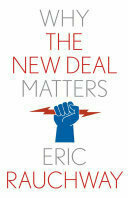
A look at how the New Deal fundamentally changed American life, and why it remains relevant today "The New Deal was America's response to the gravest economic and social crisis of the twentieth century. It now serves as a source of inspiration for how we should respond to the gravest crisis of the twenty-first. There's no more fluent and informative a guide to that history than Eric Rauchway, and no one better to describe the capacity of government to transform America for the better."—Barry Eichengreen, University of California, Berkeley The greatest peaceable expression of common purpose in U.S. history, the New Deal altered Americans' relationship with politics, economics, and one another in ways that continue to resonate today. No matter where you look in America, there is likely a building or bridge built through New Deal initiatives. If you have taken out a small business loan from the federal government or drawn unemployment, you can thank the New Deal. While certainly flawed in many aspects—the New Deal was implemented by a Democratic Party still beholden to the segregationist South for its majorities in Congress and the Electoral College—the New Deal was instated at a time of mass unemployment and the rise of fascistic government models and functioned as a bulwark of American democracy in hard times. This book looks at how this legacy, both for good and ill, informs the current debates around governmental responses to crises.